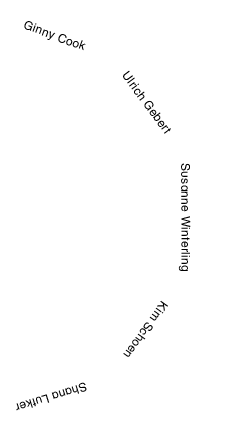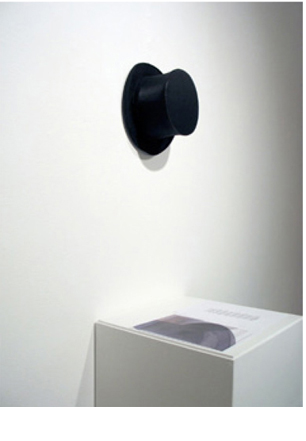
UG: Networking is such a fashionable word in the art scene, but do you actually have artist friends you can discuss your work with or is the experience after finishing education more like being the loner? Have you ever collaborated with someone on the same level for an art piece?
SMW: Actually networking is a strange term that for me applies to spiders and advertising people, but i actually have a lot of friends i talk about art and life ....it’s my fav thing not only on a bar or at my kitchen table, kind of old school i know, but also over the internet or skype. And that is where i come from as even before my education in that way as you call it we have founded the artist collective akademie isotrop which was a bunch of artists and interested people. The artist as a loner i think is an illusionary myth or loner has to be defined in a different way. Also coming from film makes you aware that so much is based on collaboration.
UG: What relationship do you have with the word “didactic”?
SMW: Didactic might be dull in terms of art, I guess that’s what you are hinting at. But i also like to discover and maybe learn things while experiencing art in a sensual as well as in a cognitive way.
UG: I think I am the only one at the moment who doesn’t think that being didactic is something that should be totally avoided. As you say, if I can learn something from an artwork, or get new insights, it is a great achievement. But it is true that there can be various ways of being “didactic”, and that includes dull approaches as well. But there is so much art out there that has no agenda whatsoever, I find it quite refreshing to see when someone has a strong opinion about her or his subject, and I am confident that this is possible without narrowing the options of interpretation to one dimension.
SMW: Yeah I totally agree somehow the word didactic has this disgusting smell around it which is not really fair. And it’s actually not such a bad tool when as you say there is so much out there, and Michel Serres put this into the words of “there is an explosion of artists” we want to and have to direct and select at certain parts. Maybe we don’t want to be taught but we definitely like to discover in art.
UG: How much emphasis do you put on research, and how much does that show in the actual work you are putting in your shows? In other words, how much information concerning historic events or biographies that your work is based on is needed for the viewer?
SMW: These are two different questions really but if you want them to be on one pile it’s difficult. Research is a basis and a starting point but it opens up a playfulness and critical gate too. It’s not necessary or actually impossible to show all in the work that would be dull or didactic, but it surely defines a precise decision of what gets to be shown smelled or experienced. From my perspective as the producer so to say i think there should and can be an overflow as well as a sharpness of a thought as long as it can give something to the viewer. An option, an offer, a sharing, but if that is too much sometimes you might just enjoy the formal solution or the sensual aspect of it.
UG: Totally agree with that. A formal or a sensual element, that keeps someone interested, can be enough for a starting point. Sometimes a simple idea is a winner, but complexity has its own beauty.
UG: Do you consider your art political?
SMW: For this i guess you have to define the term political ....that opens a bit of a discussion i guess and the best is to talk about examples. Plus i am not good in putting labels on my own work i guess, what about your own approach??
UG: I understand being political in a way of addressing social issues or issues concerning our understanding or active shaping of society as well as questions about justice. Of course this can be debated to death. I would like to see my art as being political, but that does not necessarily apply to all of my pieces.
SMW: Yeah on this level I would even go so far as by the greek definition we are political in our life if we want or not and art is surely one way where this can be emphasized and focused even in its negation. As “genre” however i think there are very different ways to address political topics in art.
SMW: The concept of Rose Peebles does kind of remind me of the idea of a remix in music- do you think that’s too far or can you see what i mean??
UG: Yes there is definitely a connection between the two. There has been many debates about the artist as a DJ, and that just describes questions about authorship. In doing a remix, at least in my understanding, the connection between the two actors is not a random one, so it actually does fit quite well.
SMW: And one might even go so far to call it a remix in opposition to a cover version which i like very much as in a remix there can be tiny funny bits of the original left, or a dedication, but not necesarily a recognition which would be demanded by the cover version and somehow throw us back too much to authorship.

